Jim Ottaviani's Blog, page 6
July 3, 2015
Scotland: I visited and I hope you get to visit too

For Ann Arbor area friends: Driving in Scotland is much like Huron River Drive, but all the time and hillier and curvier and faster and with steeper drop offs on both sides of the road and large trucks coming in from the wrong side just as the road narrows to one lane. And sheep. For hours.
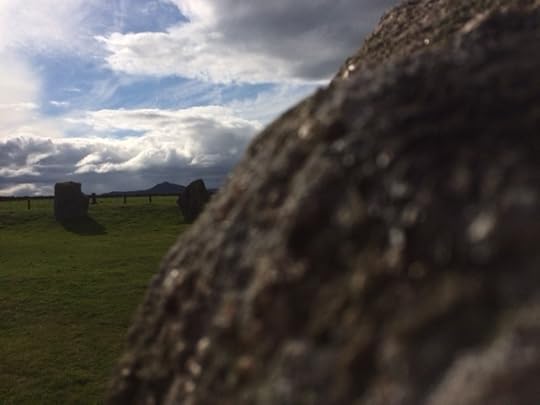
After a day of seeing amazing feats of Neolithic construction -- villages of stone, standing stones of stone, burial mounds of stone, tons of finely honed stone slabs piled on more tons of stoned and finished to near perfection and placed such that they've stood for thousands of years -- it took four of us three tries before we could cut through our dessert tart using a sharpened stainless steel knife which someone else made, sharpened, and brought to our table.

We toured a bunch of distilleries, and while this didn't make us experts in whisky-making, we got well-versed in the process and the generic tour, written from memory and then enhanded with real nouns:
To make whisky you need four kinds of stuff [1]. Grow some of the stuff [2], germinate it, and then stop germinating it by heating. That's called malting, and you can use other stuff [3] as the heat source if you want.
(Aside: Dry peat, which is basically fetal coal which needs a few million years more gestation, has no scent. It's the damp peat that you add later that gives the Islay malts their characteristic flavor.)
Now dry and turn the stuff [4], then run it through a thing [5], separating it into husk, grist, and flour. All these parts get mixed with stuff [6] in the mashing stage, and successive washes of varying temperatures extract sugar from the barley. The leftover mash is turned into feed for the approximately 6.022x10^23 sheep and cows in Scotland.
The sugar water that the livestock doesn't get is the stuff [7], and this heads into washbacks (sometimes made of wood like larch, sometimes metal), and at last, add the stuff [8]. Fermentation begins and, depending on who's doing it, will last from 40-100 hours. In the process it releases carbon dioxide, and if you stick your head in the washback and take a big sniff you'll regret it for the next half hour.
At the end of the process you basically have strong beer (7-10% alcohol) which actually tasted more like wine. Up to this point the processes for making beer, wine, and whisky are virtually identical. The difference comes in the next step, where if you do it wrong for beer or wine the end result tastes bad and if you do it wrong for whisky the end result will kill you [9]. Avoid tragedy by running the stuff [10] through the pot and the washback stills successively. These are made of copper and condense out the spirit, and you do this over and over until you get past the foreshots [11] and get to the heart. Carefully monitor the process and draw off the heart, recycling the heads and the tails [12] in later runs to extract all the good stuff. All of this stuff flows through a spirit safe, which is kept under lock and key so nobody can swipe any spirit and sell it without paying taxes.
The fetal whisky now goes into things [13]. The first thing is always made from American bourbon cask oak, charred on the inside first. Then the whisky sits for a minimum of three years, 2% evaporating each year -- that 2% is the angel's share.
(The barrels are monitored closely, since a) they're valuable, and b) still not taxable, since for a 10 year whisky the accumulated angel's share would be ~20% and nobody wants to pay taxes on stuff lost to the textbook definition of an act of god.)
Stuff [14] enters the cask to replace the lost whisky, adding stuff [15]. Sometimes there's another barrel/cask used, typically Spanish sherry, for finishing. Sometimes it just goes straight to the bottle, from which everyone drinks the stuff [16] and is happy.
1. water, barley, yeast, and heat2. barley3. peat4. barley5. mill6. water7. wort8. yeast9. ...or merely blind you.10. wash11. aka the head, aka the dangerous part12. aka the feints13. barrels14. air15. character16. Scotch
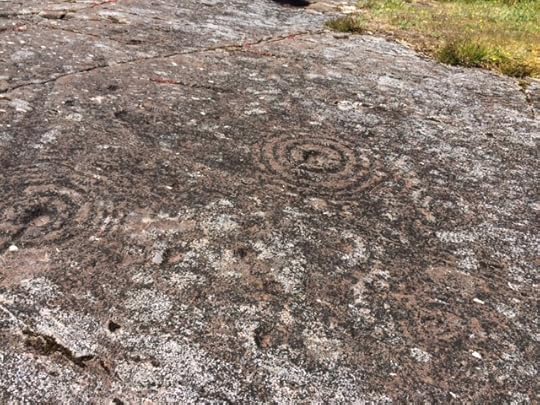 Sign coming into Edinburgh: "No hard shoulder next 150 yards." I expect if I'd looked backwards it would have said "No hard shoulder next 1362 miles." (It should have.)
Sign coming into Edinburgh: "No hard shoulder next 150 yards." I expect if I'd looked backwards it would have said "No hard shoulder next 1362 miles." (It should have.)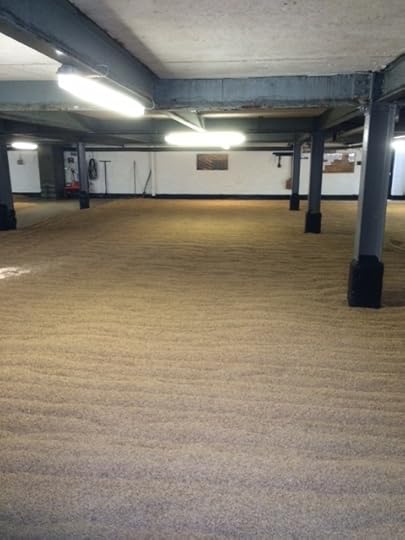 My hiking boots have been fully peated. The nose is awful.
My hiking boots have been fully peated. The nose is awful. Scotland: I visited and I hope you get to visit too
Random notes from a trip to Scotland…

For Ann Arbor area friends: Driving in Scotland is much like Huron River Drive, but all the time and hillier and curvier and faster and with steeper drop offs on both sides of the road and large trucks coming in from the wrong side just as the road narrows to one lane. And sheep. For hours.
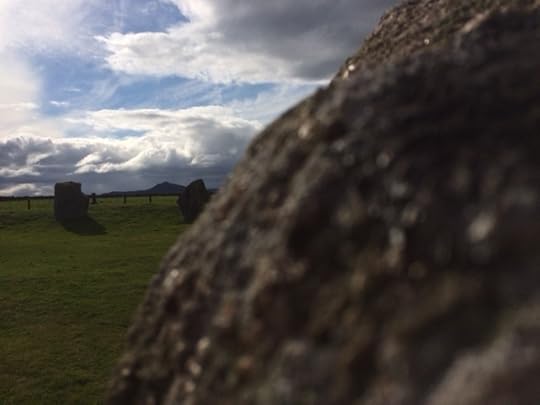
After a day of seeing amazing feats of Neolithic construction — villages of stone, standing stones of stone, burial mounds of stone, tons of finely honed stone slabs piled on more tons of stoned and finished to near perfection and placed such that they’ve stood for thousands of years — it took four of us three tries before we could cut through our dessert tart using a sharpened stainless steel knife which someone else made, sharpened, and brought to our table.

We toured a bunch of distilleries, and while this didn’t make us experts in whisky-making, we got well-versed in the process and the generic tour, written from memory and then enhanded with real nouns:
To make whisky you need four kinds of stuff [1]. Grow some of the stuff [2], germinate it, and then stop germinating it by heating. That’s called malting, and you can use other stuff [3] as the heat source if you want.
(Aside: Dry peat, which is basically fetal coal which needs a few million years more gestation, has no scent. It’s the damp peat that you add later that gives the Islay malts their characteristic flavor.)
Now dry and turn the stuff [4], then run it through a thing [5], separating it into husk, grist, and flour. All these parts get mixed with stuff [6] in the mashing stage, and successive washes of varying temperatures extract sugar from the barley. The leftover mash is turned into feed for the approximately 6.022×10^23 sheep and cows in Scotland.
The sugar water that the livestock doesn’t get is the stuff [7], and this heads into washbacks (sometimes made of wood like larch, sometimes metal), and at last, add the stuff [8]. Fermentation begins and, depending on who’s doing it, will last from 40-100 hours. In the process it releases carbon dioxide, and if you stick your head in the washback and take a big sniff you’ll regret it for the next half hour.
At the end of the process you basically have strong beer (7-10% alcohol) which actually tasted more like wine. Up to this point the processes for making beer, wine, and whisky are virtually identical. The difference comes in the next step, where if you do it wrong for beer or wine the end result tastes bad and if you do it wrong for whisky the end result will kill you [9]. Avoid tragedy by running the stuff [10] through the pot and the washback stills successively. These are made of copper and condense out the spirit, and you do this over and over until you get past the foreshots [11] and get to the heart. Carefully monitor the process and draw off the heart, recycling the heads and the tails [12] in later runs to extract all the good stuff. All of this stuff flows through a spirit safe, which is kept under lock and key so nobody can swipe any spirit and sell it without paying taxes.
The fetal whisky now goes into things [13]. The first thing is always made from American bourbon cask oak, charred on the inside first. Then the whisky sits for a minimum of three years, 2% evaporating each year — that 2% is the angel’s share.
(The barrels are monitored closely, since a) they’re valuable, and b) still not taxable, since for a 10 year whisky the accumulated angel’s share would be ~20% and nobody wants to pay taxes on stuff lost to the textbook definition of an act of god.)
Stuff [14] enters the cask to replace the lost whisky, adding stuff [15]. Sometimes there’s another barrel/cask used, typically Spanish sherry, for finishing. Sometimes it just goes straight to the bottle, from which everyone drinks the stuff [16] and is happy.
1. water, barley, yeast, and heat
2. barley
3. peat
4. barley
5. mill
6. water
7. wort
8. yeast
9. …or merely blind you.
10. wash
11. aka the head, aka the dangerous part
12. aka the feints
13. barrels
14. air
15. character
16. Scotch
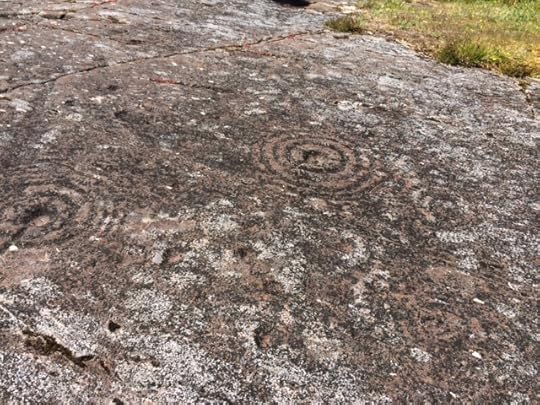
Sign coming into Edinburgh: “No hard shoulder next 150 yards.” I expect if I’d looked backwards it would have said “No hard shoulder next 1362 miles.” (It should have.)
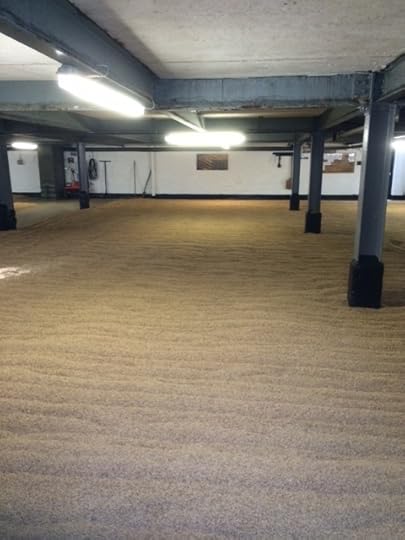
My hiking boots have been fully peated. The nose is awful.
February 15, 2015
What to do about good reviews and fans: Two quotes from Heinlein
The first one is a downer, but it goes to show that some things don't change fast enough, sadly enough. Writing to Marion Zimmer Bradley in 1964, he had this to say about behavior he experienced at the hands of people who ostensibly loved science fiction in general and his work in specific:
"The unique problem of organized fandom is one that I have wondered about for many years. Here is a group made up largely of well-intentioned and mentally-interesting people -- how is it and why is it that they tolerate among themselves a percentage of utter jerks?--people with no respect for privacy, no hesitation at all about libel and slander, and a sadistic drive to inflict pain. Marion, I do not understand it."
I've been lucky in this, and have encountered few utter jerks. A lot of friends and artists I've worked with have not -- this is especially true for the women professionals -- and I'm clearly no smarter than Heinlein, since I also do not understand it.
On a more positive note (in terms of maintaining sanity) RAH, writing to John W. Campbell in 1941, shows he knew not to be so foolish as to take reviews that glow to heart:
"The write-up made me sound so omniscient that I was tempted to call myself up and ask for some advice and a little coaching."
I've been lucky to get some flattering reviews myself, and I do wonder who that writer is they're talking about, and could I maybe meet him someday.
The converse is true as well. When someone hates your book (I just noticed my first one-star review for Feynman on Amazon) it doesn't mean I'm no longer omniscient...I just never was.
Now, back to writing things I hope I can be proud of, and that maybe some other people will like.
What to do about good reviews and fans: Two quotes from Heinlein
I’m in the middle of the first volume of Patterson’s meticulous biography of Robert Heinlein (Robert A. Heinlein in Dialogue with His Century: Learning Curve) and among the many interesting things RAH said, in interesting ways, the following two quotes stuck out.
The first one is a downer, but it goes to show that some things don’t change fast enough, sadly enough. Writing to Marion Zimmer Bradley in 1964, he had this to say about behavior he experienced at the hands of people who ostensibly loved science fiction in general and his work in specific:
“The unique problem of organized fandom is one that I have wondered about for many years. Here is a group made up largely of well-intentioned and mentally-interesting people — how is it and why is it that they tolerate among themselves a percentage of utter jerks?–people with no respect for privacy, no hesitation at all about libel and slander, and a sadistic drive to inflict pain. Marion, I do not understand it.”
I’ve been lucky in this, and have encountered few utter jerks. A lot of friends and artists I’ve worked with have not — this is especially true for the women professionals — and I’m clearly no smarter than Heinlein, since I also do not understand it.
On a more positive note (in terms of maintaining sanity) RAH, writing to John W. Campbell in 1941, shows he knew not to be so foolish as to take reviews that glow to heart:
“The write-up made me sound so omniscient that I was tempted to call myself up and ask for some advice and a little coaching.”
I’ve been lucky to get some flattering reviews myself, and I do wonder who that writer is they’re talking about, and could I maybe meet him someday.
The converse is true as well. When someone hates your book (I just noticed my first one-star review for Feynman on Amazon) it doesn’t mean I’m no longer omniscient…I just never was.
Now, back to writing things I hope I can be proud of, and that maybe some other people will like.
December 16, 2014
Something(s) to read, 2014
inside and reading more. You might also plan to spend extra time
indoors in the next few weeks. Or months. We'll see what the Polar Vortex has to say about that. So in case you wondered, here
are the best books I read in 2014, complete with
my brief notes to myself about them. They're in no particular order -- they're all good and some are even better than that.
I hope you find
something new here that you like!
Science Fiction & Fantasy
Some Kind of Fairy TaleJoyce, GrahamI couldn't wait to return to reading it. Not sure who was telling the story in the book, or whether that person is at all believable, but (and so!) it's an excellent evocation of mystery.
ExcessionBanks, Iain M.A Culture novel, full of great ideas. The plot didn't move me (or hold me) from start to finish, probably because I read it over too extended a period. Still, as always with Banks, a worthwhile journey.
The MartianWeir, AndySuper fun super hard SF. Everybody wants to be Mark Watney...or should. Read this.
Every DayLevithan, DavidExcellent premise, execution, and resolution. Though when we discussed this in our reading group the people who knew developmental psychology weren't as convinced by it, this hooked me from the start, held me throughout.
The Girl in the RoadByrne, MonicaInteresting and well written, and even though I'm not sure I got every allusion or how things fit together in the end, it's worth re-reading to get those things, and I probably will. I still have images from it in my head.
Mr. Penumbra's 24-Hour BookstoreSloan, RobinQuite a lot of fun, and would have been almost perfect if it hadn't failed on the cryptography front. Still, that's forgivable for many great scenes and quotes, such as one describing Google's many research projects, one of which was "developing a form of renewable energy that runs on hubris."
WoolHowey, HughExcellent. You probably already knew this.
Pump Six and Other StoriesBacigalupi, PaoloA clear and present and frightening near future, esp. the title story.
Non-fiction
The Rise of Theodore RooseveltTheodore RexColonel RooseveltMorris, EdmundIt's hard to recommend these books enough. They read like novels, even the bits that would be desert dry in other people's hands. This is in part because of Morris, and largely because of Roosevelt himself...what a life. It will be hard to read biography again after this. (Not really, but it's hard to imagine a better subject, handled better.)
Duke: A Life of Duke EllingtonTeachout, TerryVery good, though I got impatient (mostly because of ignorance) with the analysis of the jazz in terms I don't understand. But this is a more complex and compelling book than others I've read about my favorite composer/arranger/bandleader.
The Sports GeneEpstein, DavidInteresting exploration of what makes top athletes what they are; so many factors, including sports-specific training and mental databases, but mostly? Optimized body types and good genes coupled with good training.
Ten Years in the TubHornby, NickCombines previous books, but with a couple hundred pages I hadn't read. They are, like what came before, excellent. Makes me want to read even more.
InfidelAli, Ayaan HirsiI learned a lot I didn't want to know about the world from this book, including just how much any success and happiness I've had is earned and not just a matter of almost unbelievable good luck. (Hint: it's mostly luck.)
Fiction
Aimless Love: New and Selected PoemsCollins, BillyPoetry I like! A lot. Amazing! So many excellent choices in it.
Out of SightLeonard, ElmoreEntertaining, light, fun. Leonard writes so smoothly you forget you're reading a book.
Where'd You Go, BernadetteSemple, MariaLight and a farce and I read it just after Infidel so the mental relief was particularly good.
Lord of MisruleGordon, JaimyFantastic storytelling and imagination and world-building. Magical realism? I'm not sure, but it works through-and-through.
Graphic Novels
[I read relatively few of these this year. Probably because I was absorbed with working on one of my own (and adding to another), so that part of my brain was super-saturated with comics most of the time. But I still snuck a few excellent ones past my own defenses.]
Clockwork GameIrwin, JaneFascinating story, beautifully told and drawn. A graphic novel about the Mechanical Turk was like catnip to me, and it was fresh and good catnip and I'm still drooling and that's enough of that metaphor.
The Encyclopedia of Early EarthGreenberg, IsobelVery well done, and she's already so good that if she gets better still (I get the sense that she's young) she'll be a superstar.
This One SummerTamaki, Mariko; Tamaki, JillianEverybody already knows this book is terrific, right?
The Shadow HeroYang, Gene; Liew, SonnyHo hum, another fabulous book with Gene Yang's name on it. Doesn't he get tired of being better than everybody else? (I hope not.) This time, a superhero story, with great art by Sonny Liew.
The PropertyModan, RutuWell done, and heavily layered. Worth reading again.
BlufftonPhelan, MattAnother book about summer, and this too captures it perfectly. It does so differently from the Tamakis' book, proving that there's more than one way to be wonderful.
Walt Before Skeezix: 1918-1920King, Frank O.Nostalgia for something I never knew, and wouldn't have participated in is a weird and wonderful feeling.
The Warren Commission Report: A Graphic InvestigationMishkin, Dan; Colon, Ernie; Drozd, JerzyExcellent, detailed, and true to its subject matter.
The Cartoon Introduction to PhilosophyPatton, Michael F.; Cannon, KevinGreat introduction to the major fields of philosophy. You can't buy this yet, but when you can, you should.
Something(s) to read, 2014
It’s finally getting cold again, and I’m staying
inside and reading more. You might also plan to spend extra time
indoors in the next few weeks. Or months. We’ll see what the Polar Vortex has to say about that. So in case you wondered, here
are the best books I read in 2014, complete with
my brief notes to myself about them. They’re in no particular order — they’re all good and some are even better than that.
I hope you find
something new here that you like!
Science Fiction & Fantasy
Some Kind of Fairy Tale
Joyce, Graham
I couldn’t wait to return to reading it. Not sure who was telling the story in the book, or whether that person is at all believable, but (and so!) it’s an excellent evocation of mystery.
Excession
Banks, Iain M.
A Culture novel, full of great ideas. The plot didn’t move me (or hold me) from start to finish, probably because I read it over too extended a period. Still, as always with Banks, a worthwhile journey.
The Martian
Weir, Andy
Super fun super hard SF. Everybody wants to be Mark Watney…or should. Read this.
Every Day
Levithan, David
Excellent premise, execution, and resolution. Though when we discussed this in our reading group the people who knew developmental psychology weren’t as convinced by it, this hooked me from the start, held me throughout.
The Girl in the Road
Byrne, Monica
Interesting and well written, and even though I’m not sure I got every allusion or how things fit together in the end, it’s worth re-reading to get those things, and I probably will. I still have images from it in my head.
Mr. Penumbra’s 24-Hour Bookstore
Sloan, Robin
Quite a lot of fun, and would have been almost perfect if it hadn’t failed on the cryptography front. Still, that’s forgivable for many great scenes and quotes, such as one describing Google’s many research projects, one of which was “developing a form of renewable energy that runs on hubris.”
Wool
Howey, Hugh
Excellent. You probably already knew this.
Pump Six and Other Stories
Bacigalupi, Paolo
A clear and present and frightening near future, esp. the title story.
Non-fiction
The Rise of Theodore Roosevelt
Theodore Rex
Colonel Roosevelt
Morris, Edmund
It’s hard to recommend these books enough. They read like novels, even the bits that would be desert dry in other people’s hands. This is in part because of Morris, and largely because of Roosevelt himself…what a life. It will be hard to read biography again after this. (Not really, but it’s hard to imagine a better subject, handled better.)
Truck: A Love Story
Perry, Michael
Fully entertaining, with some especially good bits of writing and insight about writing. And i’s about a truck.
Duke: A Life of Duke Ellington
Teachout, Terry
Very good, though I got impatient (mostly because of ignorance) with the analysis of the jazz in terms I don’t understand. But this is a more complex and compelling book than others I’ve read about my favorite composer/arranger/bandleader.
The Sports Gene
Epstein, David
Interesting exploration of what makes top athletes what they are; so many factors, including sports-specific training and mental databases, but mostly? Optimized body types and good genes coupled with good training.
Ten Years in the Tub
Hornby, Nick
Combines previous books, but with a couple hundred pages I hadn’t read. They are, like what came before, excellent. Makes me want to read even more.
Infidel
Ali, Ayaan Hirsi
I learned a lot I didn’t want to know about the world from this book, including just how much any success and happiness I’ve had is earned and not just a matter of almost unbelievable good luck. (Hint: it’s mostly luck.)
Fiction
Aimless Love: New and Selected Poems
Collins, Billy
Poetry I like! A lot. Amazing! So many excellent choices in it.
Out of Sight
Leonard, Elmore
Entertaining, light, fun. Leonard writes so smoothly you forget you’re reading a book.
Where’d You Go, Bernadette
Semple, Maria
Light and a farce and I read it just after Infidel so the mental relief was particularly good.
Lord of Misrule
Gordon, Jaimy
Fantastic storytelling and imagination and world-building. Magical realism? I’m not sure, but it works through-and-through.
Graphic Novels
[I read relatively few of these this year. Probably because I was absorbed with working on one of my own (and adding to another), so that part of my brain was super-saturated with comics most of the time. But I still snuck a few excellent ones past my own defenses.]
Clockwork Game
Irwin, Jane
Fascinating story, beautifully told and drawn. A graphic novel about the Mechanical Turk was like catnip to me, and it was fresh and good catnip and I’m still drooling and that’s enough of that metaphor.
The Encyclopedia of Early Earth
Greenberg, Isobel
Very well done, and she’s already so good that if she gets better still (I get the sense that she’s young) she’ll be a superstar.
This One Summer
Tamaki, Mariko; Tamaki, Jillian
Everybody already knows this book is terrific, right?
The Shadow Hero
Yang, Gene; Liew, Sonny
Ho hum, another fabulous book with Gene Yang’s name on it. Doesn’t he get tired of being better than everybody else? (I hope not.) This time, a superhero story, with great art by Sonny Liew.
The Property
Modan, Rutu
Well done, and heavily layered. Worth reading again.
Bluffton
Phelan, Matt
Another book about summer, and this too captures it perfectly. It does so differently from the Tamakis’ book, proving that there’s more than one way to be wonderful.
Walt Before Skeezix: 1918-1920
King, Frank O.
Nostalgia for something I never knew, and wouldn’t have participated in is a weird and wonderful feeling.
The Warren Commission Report: A Graphic Investigation
Mishkin, Dan; Colon, Ernie; Drozd, Jerzy
Excellent, detailed, and true to its subject matter.
The Cartoon Introduction to Philosophy
Patton, Michael F.; Cannon, Kevin
Great introduction to the major fields of philosophy. You can’t buy this yet, but when you can, you should.
November 18, 2014
Suspended in Language in translation
Kodansha -- via their Blue Backs line of books -- did a wonderful job with Feynman and I've been very pleased with all the Korean editions of my books as well, so I'm excited and pleased to have my two physics heroes meet up out on the Pacific Rim.
Suspended in Language in translation
Briefly: Suspended in Language will soon (where “soon” is a ways off, really, since translation takes a while!) be available in Japanese from Kodansha and Korean from Green Knowledge.
Kodansha — via their Blue Backs line of books — did a wonderful job with Feynman and I’ve been very pleased with all the Korean editions of my books as well, so I’m excited and pleased to have my two physics heroes meet up out on the Pacific Rim.
September 18, 2014
G.T. Labs books: now DRM-free at comiXology
I was happy when comiXology asked me to join the second wave of DRM-free books, since it allowed me to make the books available to a wider audience. Will some of that audience share the books in ways I'd rather they didn't? Maybe, but I suspect most won't, and the benefits of making the books easier to read will be worth it.
This isn't my first foray into DRM-free, though the first was a smaller scale. I worked with the Ann Arbor District Library a couple of years ago to release a few titles to AADL card-holders available. We went back and forth quite a bit on how that would work, and in the end instead of of requiring one of those hated click-through agreements, I wrote this and attached it to all the files:
A note from the author:
Hi! Jim Ottaviani here, writing to say thanks for downloading [BOOK TITLE]. You probably expected to see a bunch of legalese at this point, but I almost never make it all the way through those licenses myself, so you won't get that here. You also won't get passwords, due dates, or DRM. We want you to read this book however it suits you, be it on a desktop computer, a laptop, a tablet, a phone... From here on out, this copy is yours.
So, I hope you enjoy [BOOK TITLE], and if you do I have two requests.
If you want to share it with friends who live in Ann Arbor, please encourage them to get the book from AADL themselves. This is an experiment for both the library and me; we'd like to find out how many people want to read books this way. So if your friends live here, they can get it the same way you did, and that would help us learn more. And hey, if they don't already have a library card, now is the perfect time for them to get one! AADL is a wonderful resource, and you'll both be happy you introduced them to it.
And if you planned to send it to a friend from out of town? Well, while it's uncomfortable to say it so plainly, here goes: You and I chip in via taxes to support all the great books, music, and movies -- not to mention services -- AADL provides. Some of my share comes from sales of the books I write. If you give this to someone who hasn't chipped in, either directly or indirectly, we'll end up with fewer great things to watch and listen to and read. So instead of sending them your copy, please suggest that they buy one, or ask their local library to order one for its collection.
Thanks for reading, and again, I hope you enjoy the book.
So far, so good I think. And now, in partnership with comiXology, the experiment goes global.
G.T. Labs books: now DRM-free at comiXology
The title says it all, but in case you want more, you can read the press release: “New DRM-free Publishers at ComiXology“.
I was happy when comiXology asked me to join the second wave of DRM-free books, since it allowed me to make the books available to a wider audience. Will some of that audience share the books in ways I’d rather they didn’t? Maybe, but I suspect most won’t, and the benefits of making the books easier to read will be worth it.
This isn’t my first foray into DRM-free, though the first was a smaller scale. I worked with the Ann Arbor District Library a couple of years ago to release a few titles to AADL card-holders available. We went back and forth quite a bit on how that would work, and in the end instead of of requiring one of those hated click-through agreements, I wrote this and attached it to all the files:
A note from the author:
Hi! Jim Ottaviani here, writing to say thanks for downloading [BOOK TITLE]. You probably expected to see a bunch of legalese at this point, but I almost never make it all the way through those licenses myself, so you won’t get that here. You also won’t get passwords, due dates, or DRM. We want you to read this book however it suits you, be it on a desktop computer, a laptop, a tablet, a phone… From here on out, this copy is yours.
So, I hope you enjoy [BOOK TITLE], and if you do I have two requests.
If you want to share it with friends who live in Ann Arbor, please encourage them to get the book from AADL themselves. This is an experiment for both the library and me; we’d like to find out how many people want to read books this way. So if your friends live here, they can get it the same way you did, and that would help us learn more. And hey, if they don’t already have a library card, now is the perfect time for them to get one! AADL is a wonderful resource, and you’ll both be happy you introduced them to it.
And if you planned to send it to a friend from out of town? Well, while it’s uncomfortable to say it so plainly, here goes: You and I chip in via taxes to support all the great books, music, and movies — not to mention services — AADL provides. Some of my share comes from sales of the books I write. If you give this to someone who hasn’t chipped in, either directly or indirectly, we’ll end up with fewer great things to watch and listen to and read. So instead of sending them your copy, please suggest that they buy one, or ask their local library to order one for its collection.
Thanks for reading, and again, I hope you enjoy the book.
So far, so good I think. And now, in partnership with comiXology, the experiment goes global.



